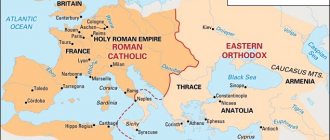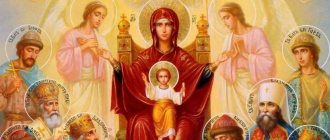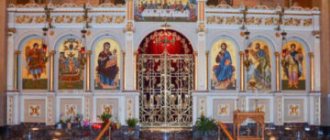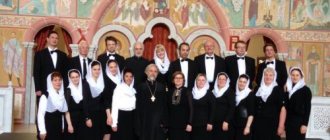Good News Online is a church for anyone who wants to study the Bible and seeks a close relationship with God. We use modern Internet technologies to serve people: we broadcast worship services and Christian television programs, we offer spiritual literature, articles, and teaching aids for downloading and reading.
The main authority for our church is God and His word, which is written on the pages of the Bible. Do you want to study and understand the Bible more deeply? Welcome to our spiritual family!
Christian Church in Russia, CIS and Europe
“Good News Online” is a Christian church that serves people via the Internet, so it doesn’t matter where you live - we are open to you anytime and anywhere! Our services are watched in Russia, Ukraine, Kazakhstan, Latvia, Germany, Moldova, Armenia, Kyrgyzstan and other CIS countries, as well as Russian-speaking Christians in Europe and the USA.
The church's vision is to “bring the gospel to the immediate surroundings and even to the ends of the earth” (Colossians 1:28). We strive to carry and spread biblical teaching even to the most remote corners of the planet.
CHRISTIAN CHURCH
CHRISTIAN CHURCH.
Jesus Christ spoke about his church (“on this rock I will build my church, and the gates of hell will not prevail against it,” Matthew 16:18), but during the short period of his ministry he did not give any instructions regarding its organization.
According to Christian doctrine, only the events that occurred on the day of Pentecost, after the resurrection and ascension of Christ, led to the formation of the Christian church. On this day, as the Acts of the Apostles relates, approximately three thousand people believed and were baptized; then, day after day, new ones joined them. Thus, from small communities of disciples and converts, the church arose. Also on topic:
CHRISTIANITY
Christianity spread quickly. As a result of persecution, believers found themselves scattered, and everywhere they preached the Gospel and converted people. Saul of Tarsus, who became known as Paul, was the greatest of all missionaries. The small groups of believers he gathered together became communities, or local churches. Certain issues of doctrine and practice caused disagreement between Paul and the Judeo-Christian leaders in Jerusalem and were the subject of discussion at a council held in that city in 50 AD.
By the end of the 1st century. Christian communities existed in almost every city in the Mediterranean countries - in Asia Minor, Southern Europe and North Africa. Christian preachers reached India and China. The Roman emperors executed many Christians, but the church continued to grow in size and power. Emperor Constantine the Great, with his edict, proclaimed tolerance of Christianity, and on his deathbed he himself accepted baptism. By the end of the 4th century. Christianity established itself as the official religion of the Roman Empire.
Also on topic:
RUSSIAN ORTHODOX CHURCH
The churches of the eastern part of the empire subsequently formed the Eastern Orthodox Church, the churches of the western part of the empire turned into a single and powerful organization, the Catholic Church, headed by the Pope. The Eastern and Western branches of Christianity have only minor differences in doctrinal matters, but differ quite greatly in organizational terms and in liturgical practice. The relationship between them is very weak. The western branch of the church spread beyond Italy and southern Europe, taking over the countries of the north and west; by the beginning of the 16th century. it dominated all of Europe. Along with these two largest Christian churches, there were also smaller churches, in particular the Nestorian, Coptic, Ethiopian and Armenian-Gregorian. see also
EASTERN CHRISTIAN CHURCHES.
At the beginning of the 16th century. A movement to reform the church began. This movement was called the Protestant Reformation. It was led by clergy - Martin Luther in Germany and his like-minded people in other countries. They encountered fierce opposition from the church authorities and, abandoning attempts to achieve the desired reforms in the Roman Church, organized their followers outside this church. This is how the Protestant branch of Christianity arose. However, Protestantism from the very beginning gave rise to many Protestant churches, or denominations, and did not represent a single and comprehensive structure.
Also on topic:
ROMAN CATHOLIC CHURCH
From Europe, Christianity - in its various forms - spread to America, and today the Church of Christ exists in all countries of the world.
Since its inception, the church has been in conflict with the state. During the era of the Roman Empire, the adoption of Christianity was regarded as an expression of opposition to Caesar and the state, which led to persecution of Christians and their martyrdom. Subsequently, due to the difficulty of traveling and maintaining connections between different peoples, churches began to unite along national lines, and the question of the superiority of the church over the state or the state over the church arose with particular urgency. The Church found itself embroiled in a political struggle, and the leaders of the Reformation had to turn to princes and rulers for help and protection. In some countries, the state asserted its authority over the church, and some national churches, such as the modern Anglican Church, came to be headed by a head of state. Many other countries adhere to the principle of separation of church and state.
Christians have never agreed on the nature of the church. Orthodoxy sees in the church a mystical and sacramental (based on the sacraments) unity, connecting all believers of the past, present and future with each other and with Christ as the Head of the church. For Roman Catholics, the church is a visible community of those living people who have been baptized as Catholics and have not been excommunicated. From the point of view of Protestants, the church is invisible and unites Christians of all ages (or all who are now being saved or have already been saved).
After the Reformation, “free churches” began to multiply. Groups of Christians who agreed on certain points of doctrine or religious practice began to unite into independent, autonomous congregations. Sometimes like-minded communities in different places united with each other, giving rise to a new sect or denomination. The "free church" movement is especially strong in the United States.
However, in the 20th century. Increasing attention began to be paid to the problem of unifying the Christian church, and the result was the realization that differences within the church are differences between parts of a single whole. Perhaps never before has the idea of the unity of the Body of Christ received such recognition. The unification movement was led by Protestants, supported by many Orthodox Christians, as well as Catholics (especially after the Second Vatican Council, 1962–1965). By the early 1990s, the Christian Church was the largest religious organization in the world, with an estimated membership of approx. 1.5 billion people. Of these, approx. 900 million were Roman Catholics, approx. 145 million – Orthodox and approx. 400 million are Protestants.
Awareness of the universal character of the church found expression in the desire for greater mutual understanding and cooperation between Christians of different countries. There are world unions of Baptists, Congregationalists, Lutherans, and the World Alliance of Reformed Churches that maintain the Presbyterian system. Truly ecumenical is the World Council of Churches, which represents 300 churches from approximately 100 countries. see also
CHRISTIANITY; COUNTER-REFORMATION; REFORMATION; articles about individual churches.
Bible Teaching You Can Trust
On the website of our church you can watch video sermons of famous world pastors and preachers: Rick Renner, Kenneth Copeland, Alexander Shevchenko, Sergei Ryakhovsky, Sergei Shidlovsky, Terry Young, Tony Cook, Sergei Finaev. These are sermons on healing, service, prosperity, and many other relevant topics and issues.
In your Bible study, you will be helped by daily “Change Your World” programs, a Bible reading plan, articles on various spiritual and life topics: healing, prayer, victory over fear, depression, prosperity, Christian upbringing, family, marriage, relationships, spiritual growth, Christian values and many other topics.
On the Good News Online church website you can also download free Christian books by Rick Renner, Denise Renner and other authors, study guides for studying the texts of the Old and New Testaments.
№9 (9) / January 5 '94
World of sects
In this topic:
World of sects
Children of the Electric God...
World of sects
God forbid I go crazy!.. A conversation with a psychiatrist about fashionable religious sects
A couple of years ago, preachers of a new teaching appeared in our country, calling themselves the “Church of Christ” or “Church of Christ.” Soon the foreign missionaries had their first converts.
Many felt that in addition to the Baptists, Adventists and Pentecostals, another Protestant denomination had begun to operate in our country. However, it is not. Due to the ignorance of Russian government agencies, an extremely active and dangerous totalitarian sect was registered in Russia, which the public is fighting against in many countries around the world.
The “Church of Christ” (hereinafter referred to as CH) was born quite recently, in 1979, when a young pastor, Kip McKean, was appointed to a small Protestant community in Boston. Most of the parishioners left the parish when McKean began to preach his own doctrine, but converts soon began to appear. During the first ten years of the sect's existence, the number of McKean's followers grew many thousands of times, and new churches opened in dozens of cities in many countries around the world.
What explains such incredible success of the new cult? First of all, a successful combination of an extremely primitive interpretation of Christianity with unusually aggressive methods of influencing the individual, the purpose of which is to suppress a person’s critical feelings and thinking abilities. A characteristic feature of the sect is the system of “mentoring”, according to which every word of the “mentor” becomes the highest law for the “student”. Although the Church of Christ asserts the indisputable authority of every letter of the Holy Scripture for its members, in reality the only criterion of truth becomes the words of the “mentor.” The sect is built on a “pyramidal” principle: each “mentor” has several “disciples,” who, in turn, are “mentors” and have their own “disciples,” and so on.
LET'S RETURN TO EYEWITNESS TESTIMONY
Here is what Protestant pastor Steve Wookey writes about the Church:
The Church of Christ resorts to classical recruitment methods used in most totalitarian cults. Its characteristic feature is a detailed system of psychological pressure on the members of the sect themselves and on everyone who falls into the orbit of their missionary activities. This pressure is both personal and group in nature. Here are some of their methods:
Pressure
* Obsession: people pester you on the street, in a store, at college, at work. Sectarian missionaries literally stick to you. Once you give in and in response to persistent requests to leave your home phone number, you will be constantly bombarded with calls, invited to “Bible circles”, to worship services, etc. Even if you say that you are already a Christian and a member of the Church, the calls will not stop . Victims of the “educational” work of sectarians argue that you need to yell at these “missionaries” so that they leave you alone.
* Not a minute of free time: if you do start attending their meetings, make sure that you are busy every hour and every minute. The intense system of “evangelism”, Bible studies and worship services - all under the watchful supervision of teachers and elders - will not give you time to think, stop and comprehend what is happening to you. All your personal affairs will go to waste. After a while, mentors will advise you to give up your personal life altogether.
* Group pressure: you have already become a member of the group. You no longer have any secrets. There is constant pressure on each member to submit to the will of the majority. Public rewards and reprimands are widely practiced. There are known cases when members of a sect were subjected to many hours of public reproof and punishment for attending services in another church. You don't even notice how the desire to please the group is brought up in you. Any critical remark addressed to leaders is immediately branded as a manifestation of a sinful state of mind. Your leaders are always right. No criticism is allowed.
* Sleep deprivation: you are constantly advised to move into one of the shared apartments, usually very overcrowded (10-15 people live in two- and three-room apartments). You have already forgotten the last time you managed to get enough sleep. Most often, you go to bed late after midnight, and are supposed to get up at half past four or six in the morning. You never get to be alone and think.
* Lack of nutrition: You are already accustomed to chronic malnutrition. If you nevertheless begin to show independent thinking, you are left without food at all. You are told that fasting is necessary to break your pride. After you fast for a few days, you will become much more malleable and suggestible.
* Guilt complex: you should only say what you should say. Any question you ask turns against you. You will not receive an answer. You will be advised to read the Bible more carefully and will be forced to repent of your actions. “How could your tongue turn? I’m ashamed of you, I’m disappointed in you,” or: “That’s not the problem, the real problem is in you,” or this: “The spirit of denial and pride speaks in you.” In the end, you understand that any question coming from you is a sin. You must take what is told to you on faith, without resorting to your own reason.
Control:
* The purpose of pressure is to control each member of the sect. This is done through a detailed “mentoring” system. Each member of the sect has a “mentor”. This maintains strict paramilitary discipline. The “mentor” constantly monitors you. You report to him daily for everything that happened to you, unconditionally obey his orders and penalties for your “sins.” A “mentor” guides your social circle. One of the former members of the sect testifies that you are allowed to meet a girl once a week, but always with different people. If you want to date one, you need special permission from your “mentor.” He will allow you to meet once a month, then once a week, but marriage can only be discussed if she converts to a sect.
You are responsible to your “mentor” for every step you take. In the end, all your connections with the outside world will be severed, and you will find yourself completely dependent on the Central Church. It must be added that the main goal of all this is to create an atmosphere in which the mentor is always right, his word is final, his power is absolute. Therefore, it is extremely difficult for someone who has fallen into a sect to leave it.
Deception:
* As in any of these cults, the Church of Christ does not provide “outsiders” with truthful information about itself, and often lures new members with outright deceptions. Often they pose as members of another organization. For example, at the London Economic Institute, the missionaries of the Central Church called themselves members of the “Society of Historical Literature” or “Society of Biblical Literature.” They often present themselves as “just Christians” engaged in charitable or educational activities. In fact, they believe that only the Central Church is the true church and everyone who does not belong to it is unworthy to be called Christians and is doomed to eternal destruction.
Read carefully the lines of the letter from a former member of the Central Church, who managed to break with the sect:
I, was at university. Studying was easy for me, I had many friends, my whole life was rich and interesting. But, like many people, I experienced some spiritual dissatisfaction and was looking for an answer to the questions that worried me.
I have already completed my first year. when a friend of mine—a bright, attractive, and friendly man—invited me to his church for Sunday worship. I decided to go because I didn’t want to consider myself a limited person, closed to everything new. After the service, he invited me to study the Bible together. Soon we were meeting regularly.
And I attended his church not only on Sundays, but also on other days. These men made a deep impression on me with their strict morality, their adherence to the biblical word, and their devotion to the church. It seemed to me that my own life, habits and ideas were greatly inferior in comparison.
Many people warned me that this group was a totalitarian sect. However, my friend did not leave me and insisted on the regularity of our meetings. He showed such perseverance, such love and care that it was impossible to answer “no”. And so it happened that I became convinced of the truth of the teachings of the “Church of Christ.” I was baptized and became a member. For several months I hid my baptism from my family.
Shortly after my baptism, I discovered that all church meetings and activities were required of all church members. One Sunday evening there was a concert in the church. I had to study for an exam and decided to skip it. A student friend of mine, who was the leader of our group, reproached me for this. So I learned that not only worship services are required to attend, but also symposiums, evangelistic meetings, morning meditations, Bible discussions, conferences, seminars, an abundance of group meetings, and, of course, monetary contributions. Each church member commits to regularly contribute a certain amount to the church fund. Everyone is strictly responsible for fulfilling this obligation. In addition, mentors periodically require contributions of money for special projects. I was also persuaded to live in the same apartment with another “brother”. If I had questions about all this, and had the courage to ask them, they always answered me like this: “It’s not that, it’s that your heart is not yet broken,” or: “Do you really not know the Bible at all?” or: “I’m disappointed in you; I didn’t think you could ask a question like that,” or, “Brother, you have to change.”
My friend became my mentor. We met at least three times a week. I was told to imitate him and be submissive to him in everything. One preacher declared that we should be “madly devoted” to our mentors. After I was baptized a second time (because, as they explained to me, my first repentance turned out to be false), I myself became a mentor. We were required to bring one to five people a day to church and get as many phone numbers of potential “brothers” as possible.
I had to select people who could become leaders and mentors in the future. As I became more involved in church affairs, my grades at the university became worse and worse. There was no time left to meet with friends - not members of the sect. My sense of humor completely disappeared. When my friends and family asked what was happening to me, I perceived their questions as satanic temptations. I was not happy in this church. My mentor constantly assured me that the more people I could convert to the true faith, the clearer everything would become for me. At that time, I believed that there was only one alternative: the Church of Christ - or eternal torment in hell.
My parents invited specialists familiar with the teachings of the Church of Christ. I was unable to answer a number of serious questions they raised. After five minutes of conversation with them, I knew that I had made a serious mistake somewhere, but it took me three days of continuous conversations with them to realize all the lies of the teachings and methods of the Central Church. Soon after that I left her.
If I had not heeded this advice, I would have spent many more years in this sect, and perhaps the rest of my life. Membership was a difficult experience. And my advice to each of its members is to leave the Church as soon as possible and start a full-fledged normal life.
There is a lot of evidence similar to the above. But I think that what has already been said is enough to convince us of the enormous destabilizing and destructive potential the Church of Christ has. This classic totalitarian cult is extremely dangerous both for each of its members and for society as a whole.
“Know the truth, and the truth will set you free,” Christ said to His disciples. Freedom—real and true—is the hallmark of Christianity. Any sect, any cult that denies freedom has nothing in common with Christ and His Church. If we remember the atom, we will always recognize totalitarian sects.
Let us be attentive and careful. The Church of Christ is one of them.
In other rooms:
Prayer and support
Do you need prayer for healing, prayer for finances, prayer for children or for family? Good News Online Church is ready to serve you. One of the tasks of our church is prayerful support for people. Go to the prayer wall and write your prayer need. The church team, as well as many believers around the world, will pray for you in agreement! We believe that praying together has great power. If you are trying to find an answer from God, or don’t know how to pray, the ministers of our church will help you.
Internal structure of the Christian church
Altar. This is a symbol of the Kingdom of Heaven and the realm of God's existence. The semicircular altar is usually separated from the middle part of a Christian church by a special altar barrier. It develops to the iconostasis. Inside the altar there is a special throne that serves for the performance of certain church sacraments.
On the left side of the throne there is usually an altar. This place is necessary for the performance of proskomedia. To the right of the throne is the deaconnik, i.e. a place where liturgies are celebrated. The part of the altar directed to the east has one or three apses - rounded shapes. The elevation that is located between the altar and the middle part of the Christian church is called the solea. This is the place of all clergy. In its center is the pulpit, necessary for preaching.
The middle part of the Christian church is a kind of world of Angels and righteous people, symbolizing the human nature of Jesus Christ and the soul of man. This part can have a variety of shapes - from oblong or round to octagonal. Today the most common cross-domed form of church. Inside the middle part of the church there are usually choirs (galleries), as well as additional chapels - special altars facing east and separated from the main church by their own iconostasis.
It is worth noting that the entire interior of the Christian church is covered with wall paintings. These are frescoes. They are arranged according to the principle of the hierarchy of sacred images and in accordance with the symbolism of all parts of the temple. All frescoes represent stylistic unity - a single dogmatic system, which is directly related to the liturgical action. The altar is also painted with frescoes.











